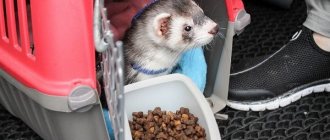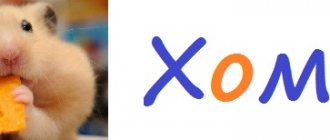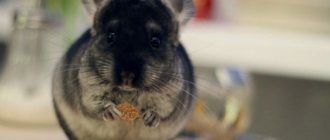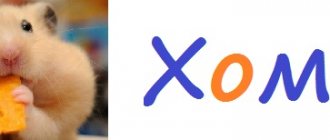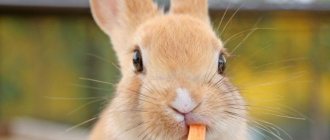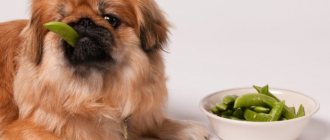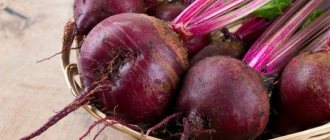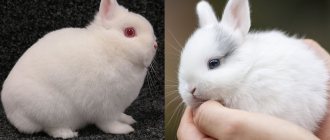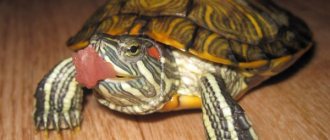The health and full life of ferrets depends entirely on proper feeding. If the diet is incorrect, this becomes the cause of various diseases and the pet’s life expectancy is significantly reduced.
Although the ferret belongs to the category of domestic animals, it cannot be compared with a cat and a dog. There are situations when ferret owners give their pets dog or cat food. This is strictly prohibited! The structure of the ferret's body is not at all similar to cats or dogs, its behavior is noticeably more active. All of this greatly affects your ferret's metabolism and metabolism. This is an animal with its own needs and needs to be fed only with special food.
The ferret has predator teeth that are designed to crush bones and tear off pieces of meat. These animals are by nature hunters of insects, birds and various rodents.
What do ferrets eat?
Ferrets are carnivores by nature. In the natural environment, they independently obtain food: they hunt rodents, small birds, frogs, lizards, and insects. Animals love to eat fish, but this product is not the main one.
The animal receives the microelements and substances necessary for life from animal food. There are practically no plants in his usual menu. This fact must be taken into account when planning your diet.
Ready-made feed
Before you start feeding your ferrets, you should figure out what they can eat and what they can’t. If all the necessary products are not available at home or there is simply no way to purchase them, then you should start feeding them dry food mixtures. If the food is purchased, then you must carefully study its composition. Dry mixtures should not contain protein elements or fats of synthetic origin.
High-quality dry food mixtures are usually made from the following components:
- animal body parts;
- muscular type meat;
- poultry meat without plant components.
Important! It is not advisable to feed your ferret dog food. It contains a high level of plant components, and also does not contain a sufficient amount of taurine, and this is precisely the element that is required for the full development of the ferret.
If your pet consumes dry food mixtures for a long time, be sure to provide him with enough water. Insufficient fluid intake will eventually lead to dehydration of the pet, as a result it will become lethargic, passive, and lethargic.
How to feed a ferret at home?
You can use natural food or buy ready-made food that is sold in pet stores and veterinary clinics. The latter option is preferable, since the ready-made mixtures contain the necessary set of minerals and trace elements.
Regardless of which food option you choose, per day the animal should receive:
- animal protein – at least 30% of the total serving volume;
- fats – about 20%;
- complex carbohydrates – 10-15%;
- fiber – up to 3-5%.
Cute predators obtain food on their own only in the wild. In apartment conditions this is impossible. Therefore, the main task of the owner is to provide his pet with all the conditions for a comfortable and healthy life.
Features of feeding in different periods
The diet of ferrets becomes special at certain periods of life. What remains common is the obligatory presence of minerals and vitamins.
Growth period
During breastfeeding, young ferrets receive the nutrients their bodies need through their mother's milk. Deprived of mother's milk, ferrets' gastrointestinal tract becomes vulnerable to infections, which is why probiotics should be kept in the breeder's medicine cabinet at all times.
Ferrets are transferred to “adult” feeding 3-4 weeks after birth. At this time, their baby teeth begin to erupt. In order for babies to quickly get used to this diet, liquid minced meat is introduced into the diet, and low-fat cream or baby kefir is added to the mother’s menu.
Don’t forget about vitamins - 3-4 drops of fish oil are dripped onto the tongue of ferrets. If more male furos were born in the litter, more calcium and phosphorus are added to the food, since males are more active.
Don't forget to give your pets vitamin pastes and supplements. Lack of nutrients negatively affects the growth and further development of ferrets.
Shedding period
Furo molt in early spring and autumn, with the exception of pregnant females who shed on the 20th day of pregnancy, and animals that have suffered a hormonal imbalance. Shedding lasts 1-2 weeks and is accompanied by severe itching. In some areas of the body there is practically no hair.
Ferrets are very clean, so they carefully lick themselves, as a result of which a lot of hair gets into the gastrointestinal tract and vomiting begins. To prevent this from happening, the animals are given fur-removing pastes. Pets are helped to cope with shedding by combing their fur with a brush or using a furminator.
During molting, ferrets need vitamin complexes containing sulfur, brewer's yeast and B vitamins. Thanks to which the new fur will be thick and shiny.
Pregnancy period
In order for the offspring to be born healthy, a pregnant female is given an individual diet.
The menu of a pregnant female must contain:
- phosphorus, calcium for strong teeth and bones;
- vitamins A, E, D and group B - in increased quantities.
When feeding chorihi with natural food, the menu includes meat and bone meal, calcined cottage cheese, and fish oil. If the female eats dry snacks, she is given special food for pregnant women or a product intended for cats. You can’t overfeed a choriha – this leads to obesity, but limiting the female’s nutrition is also dangerous.
Before childbirth and in the first days after it, the chorikha's appetite worsens. The ferret's menu during lactation is identical to the diet during pregnancy. Nutrient requirements are still high.
What should you not feed your ferret?
To avoid harming your pet, keep it away from vegetables and fruits. The ferret's digestive system is not designed to digest large quantities of plant foods.
What else you need to give up:
- bakery;
- any nuts;
- desserts that contain sugar;
- products containing salt, spicy spices;
- fried, smoked meat;
- onions, garlic.
Do not feed your pet from the table and do not try to give your ferret dry or canned food for dogs and cats.
Proper nutrition
Ferrets are carnivores and are not rodents. They are different from dogs and cats for this reason and their nutrition has distinctive characteristics. If dogs and cats can easily eat human food, then these animals should not be fed with this food.
These animals have a fast metabolism, for this reason they eat food that is quickly digested. Ferrets in nature eat chicks, small frogs, eggs, and carrion. They eat the prey completely, they even eat the entrails, bones and fur.
Note! No matter how much a ferret eats at one time, it will all be digested within 4 hours. Their stomach size is small, it contains simple microflora, for this reason the plants are not digested in it, they come out in their original state.
But how to properly feed ferrets at home? Of course, you don't have to go hunting every day, just include raw meat in their diet. It is important that every day this animal’s body receives the required level of taurine; this element is required to ensure normal functioning of the heart and liver. It is found in the following types of meat:
- turkey;
- chicken;
- duck.
The ferret must eat meat every day; this is considered a mandatory rule.
You should also include porridge in your diet; it should be boiled. The volume of this food should be 15% of the total amount of mixtures consumed. The main function of cereals is to improve peristalsis.
The balanced food contains the following list of useful components:
- quickly digestible protein of animal origin. Its content should be up to 60%;
- fats 30%;
- carbohydrates with vegetable structure 10%.
Adult animals eat 2-3 times a day. But babies often eat 5 to 7 times a day. After a month, meals begin to be gradually reduced to 2-3 times a day.
Ferret diet based on natural products
If you decide to cook for your pet yourself, do not add salt and spices to its food.
The daily diet should consist of the following parts:
- two thirds – meat and offal;
- one third - porridge: buckwheat, oatmeal, millet.
Males should eat at least 300 grams per day, females - about 150-200 grams, cubs - 100 grams.
Useful tips
In order for your pet to be healthy and energetic, you need to follow a diet. You need to take care of the ferret carefully, then many problems can be avoided. You should not feed your pet only dry food. Usually they can be suitable if the owner leaves for a short time and is not able to take the ferret with him, and therefore trusts relatives or friends to look after the animal. The ferret's diet should be balanced and standardized, in accordance with age, weight and health status. It is important to feed the foods that the ferret eats.
Another important point: you cannot feed a forest predator with cat food, because this is contrary to their nature. The best ready-made food is one that has been produced specifically for this group of animals, otherwise it must be a hard no.
You should also pay attention to the diet in winter, during molting. The diet of females and males differs. Males need larger portions. You should be very careful about the quality of products and the expiration date of feed. It is also very important to observe the ferret's behavior, as sudden changes may indicate poor health of the animal. A healthy ferret is very active. Don’t forget about foods that are contraindicated for ferrets. Animals should not be overfed: the ferret should eat small portions.
In addition to the feeding regimen, you must also monitor the drinking regimen. Water must be in the shelf at all times, otherwise the ferret will simply die from dehydration. Sometimes it’s worth pampering your pet: it will bring pleasure to both you and him. It is very important to show attention and care to the animal and play with it. You can try different games, this is the only way to really find one that he really likes. If you follow all the recommendations for nutrition and care, your pet ferrets will be happy, and their nutrition will be well adjusted.
Vitamins for pets
Ferrets' nutrition should be complete and balanced. If for any reason the animal lacks vitamins, for example, in winter, when there are no fresh herbs and vegetables, there is a need to saturate and support the small organism with special supplements.
In winter, you can give sprouted grains; they are rich in vitamins. If there are no grains, you should contact a veterinary pharmacy, where you can purchase special vitamin complexes. These can be powders, drops, tablets, granules.
Vitamins presented in the form of granules and rice balls do not have any therapeutic effect; they are used for prevention.
Minerals are also necessary for the normal functioning of the body. Most often, their deficiency is compensated for by adding meat and bone meal to food (about 2 times a week).
Store-bought treats: are they worth buying?
So what kind of treats can you give your ferret? In the store, a variety of ferret treats (including cat food) immediately catch your eye. However, you should not immediately buy the first product you come across, as it can be dangerous for the animal, especially if it is abused.
First of all, you need to consult with a veterinarian what he thinks about this or that manufacturer, and also look at the packaging and read the ingredients. If the composition does not contain any meat components, and they are replaced by all kinds of sweeteners, fruits and grains, such treats will certainly not benefit the ferret.
Method 3: Farshekasha
This food option has also found its consumers, but it is difficult to prepare
There are many recipes for farshekashi; it is important that all the necessary vitamins and microelements are present in the ferret’s diet
Recipe
Required ingredients:
- Rolled flour - 40 gr.
- Buckwheat flour - 25 gr.
- Corn or wheat flour - 30 gr.
- Rice flour - 30 gr.
- Turkey or rabbit meat (chilled) - 220 gr.
- Chicken heart - 140 gr.
- Beef heart - 270 gr.
- Beef liver - 120 gr.
- Veal or beef pulp - 200 gr.
- White and dark turkey meat in equal quantities - 260 g.
- Chicken ham or thigh without skin - 400 gr. (minus bones)
- Chicken fillet - 500 gr.
- Water - 250 ml.
- Low-fat cottage cheese (0.1-0.5%) - 250 gr.
- Chicken skin - 55 gr.
- Chicken fat - 20 gr.
- Cleaned chicken gizzards - 250 gr.
- Chicken head and neck - 1200 gr.
Cooking method:
